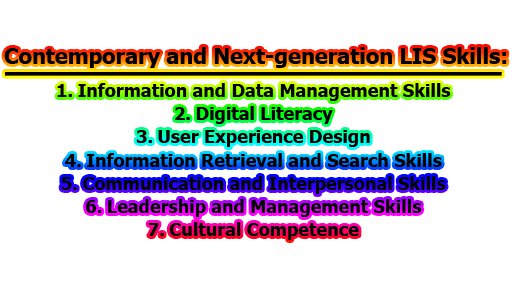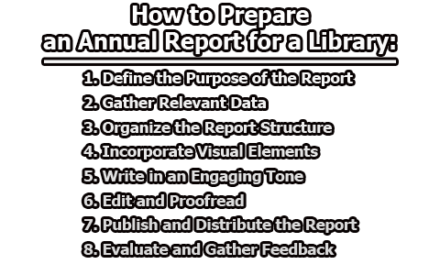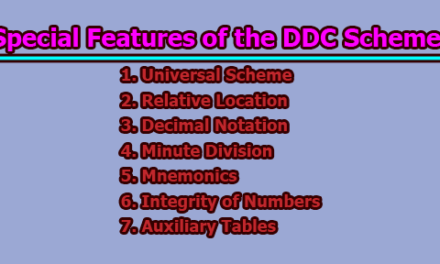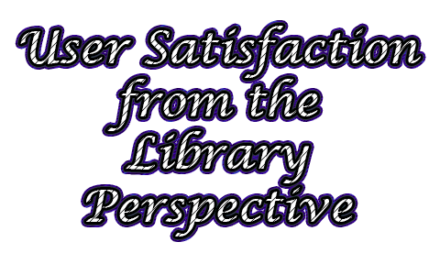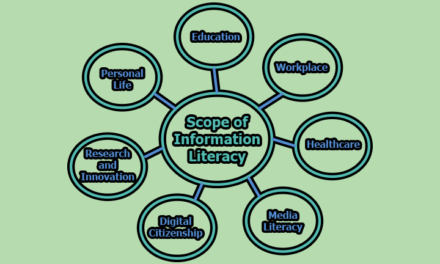Contemporary and Next-generation LIS Skills:
Library and Information Science (LIS) is an ever-evolving field that encompasses a broad range of knowledge and skills. As technology continues to transform the way we access and use information, contemporary and next-generation LIS skills are becoming increasingly important. In this article, we will explore some of the key skills that are essential for LIS professionals today and in the future.
1. Information and Data Management Skills: With the exponential growth of data, LIS professionals need to possess the information and data management skills. They should have the ability to analyze data and extract useful insights from it, as well as the ability to store and manage large amounts of data. They should be well-versed in database management systems, data warehousing, data modeling, and data visualization.
2. Digital Literacy: LIS professionals must have digital literacy skills, including an understanding of computer networks, software applications, and web-based technologies. They should have the ability to use digital tools to create, manage, and share information. Additionally, they should have an understanding of emerging technologies such as artificial intelligence, blockchain, and the Internet of Things (IoT).
3. User Experience Design: User experience design skills are increasingly important for LIS professionals, as libraries continue to become more digital and interactive. LIS professionals should be able to design user-centered digital experiences that are intuitive, accessible, and user-friendly. They should be well-versed in design thinking, usability testing, and web accessibility.
4. Information Retrieval and Search Skills: LIS professionals should have strong information retrieval and search skills, including the ability to develop search strategies, use advanced search techniques, and evaluate search results. They should have knowledge of search engine algorithms, metadata standards, and cataloging systems.
5. Communication and Interpersonal Skills: Communication and interpersonal skills are essential for LIS professionals, who must interact with a diverse range of stakeholders, including library patrons, colleagues, and community partners. LIS professionals should be able to communicate effectively, both verbally and in writing. They should have strong listening skills, the ability to work collaboratively, and the ability to adapt to different communication styles.
6. Leadership and Management Skills: LIS professionals should have leadership and management skills, including the ability to lead teams, manage budgets, and oversee projects. They should be able to set goals, develop strategic plans, and measure outcomes. They should also have knowledge of legal and ethical issues related to information access and privacy.
7. Cultural Competence: Cultural competence is increasingly important for LIS professionals, who must serve diverse communities and promote equity and inclusion. LIS professionals should have an understanding of the cultural, social, and economic factors that impact information access and use. They should be able to develop culturally responsive services and programs, and they should be committed to promoting social justice and equity.
Looking ahead, there are several emerging skills that are likely to become increasingly important for LIS professionals in the next generation. These include:
- Data Science and Analytics: LIS professionals should have skills in data science and analytics, including the ability to develop predictive models, analyze big data sets, and apply machine learning algorithms. They should be able to use data to inform decision-making and improve library services.
- Cybersecurity: As libraries increasingly rely on digital systems and networks, cybersecurity skills will become increasingly important for LIS professionals. They should be able to identify and mitigate security risks, develop security protocols, and respond to cyber threats.
- Digital Preservation: LIS professionals should have skills in digital preservation, including the ability to preserve digital content and ensure long-term access to it. They should have knowledge of digital preservation standards and best practices.
- Community Engagement: Community engagement skills will become increasingly important for LIS professionals, who must work closely with community members and organizations to promote access to information and literacy. They should have the ability to build relationships, collaborate with stakeholders, and develop community-centered programs and services that meet the unique needs and interests of local communities.
- User Research: LIS professionals should have skills in user research, including the ability to conduct user studies, gather feedback, and use data to improve library services. They should be able to design research studies, collect and analyze data, and communicate findings to stakeholders.
- Emerging Technologies: As new technologies continue to emerge, LIS professionals should be able to keep up with the latest developments and evaluate their potential impact on library services. They should be able to identify emerging trends and technologies, evaluate their potential benefits and drawbacks, and make informed decisions about how to integrate them into library services.
- Digital Humanities: LIS professionals should have knowledge and skills in digital humanities, including the ability to use digital tools and technologies to analyze and interpret humanistic data. They should be able to collaborate with scholars and researchers in the humanities, as well as develop programs and services that support digital humanities research.
In short,
i. Personal skills: The personal skills required for a new generation of LIS professionals include being; analytical, creative, technical, flexible, reflective, able to deal with a range of users, detective-like, adaptable, responsive to others’ needs, enthusiastic, and self-motivated.
ii. Generic skills: The generic skills that are respectively required are as follows: information literacy, communication, critical thinking, teamwork, ethics, social responsibility, problem-solving, and leadership.
iii. Discipline-specific knowledge: The discipline-specific knowledge which is required for the new LIS professionals includes metadata, database development and database management system, user needs, digital archiving and preservation, collection development, and content management systems.
In conclusion, contemporary and next-generation LIS skills are essential for librarians and information professionals who seek to meet the evolving needs of their communities. With the rapid pace of technological change and the increasing demand for digital services, LIS professionals must be prepared to adapt to new challenges and opportunities. By developing a broad range of skills and staying up-to-date with the latest developments in the field, LIS professionals can play a vital role in promoting access to information and advancing literacy and learning in their communities.

Library Lecturer at Nurul Amin Degree College

